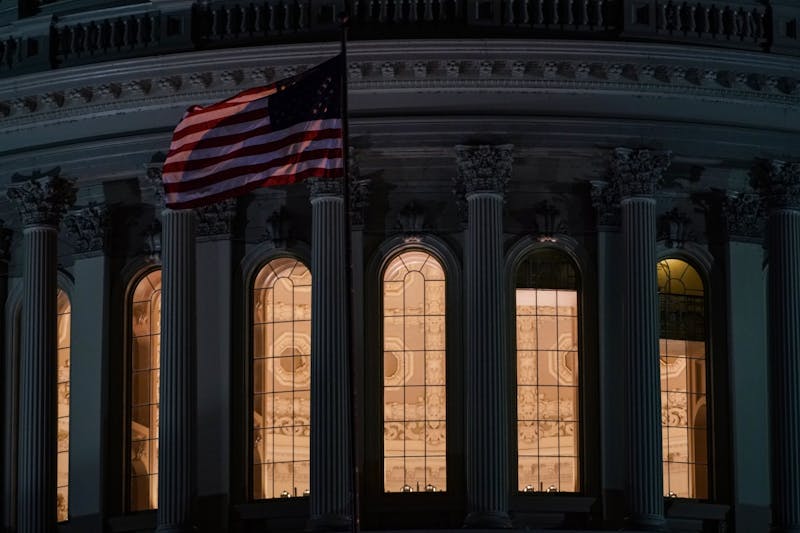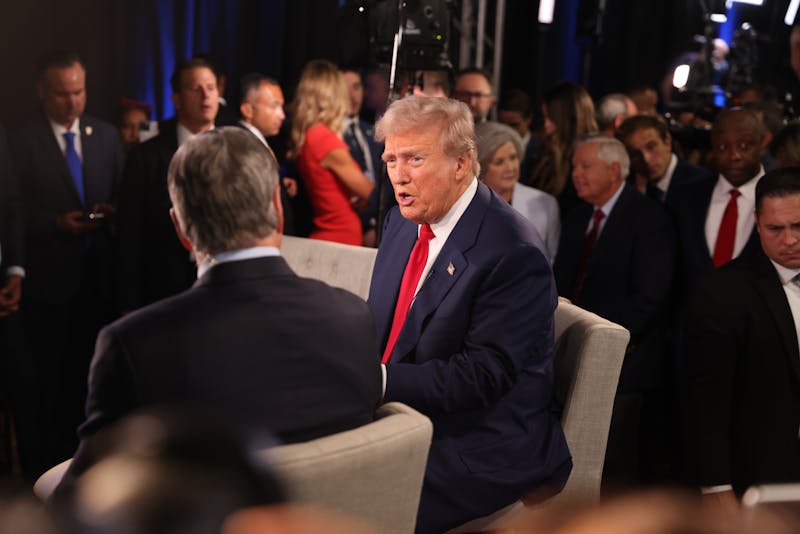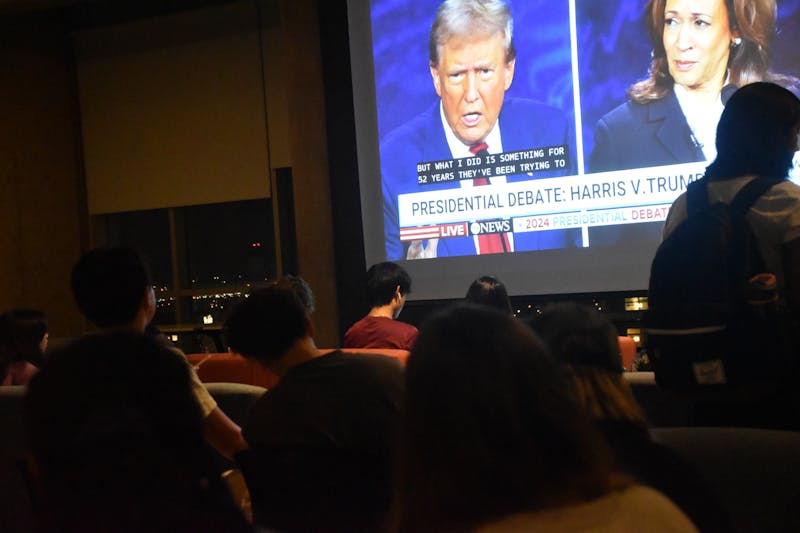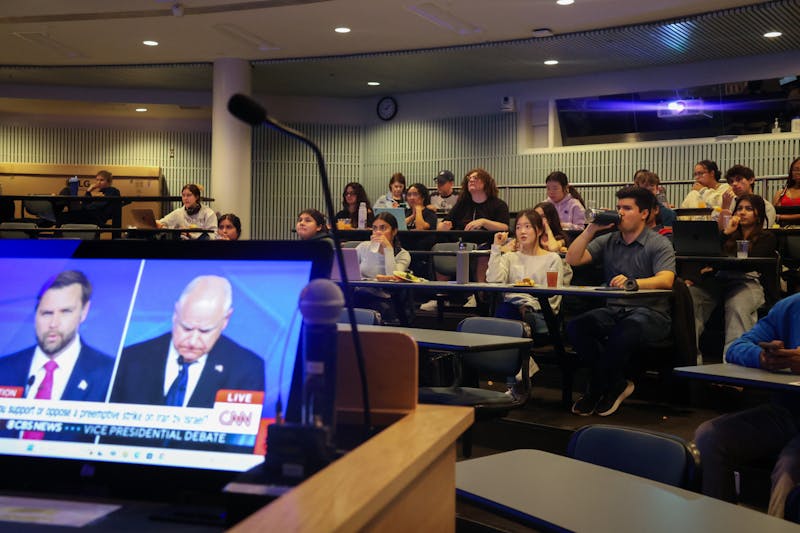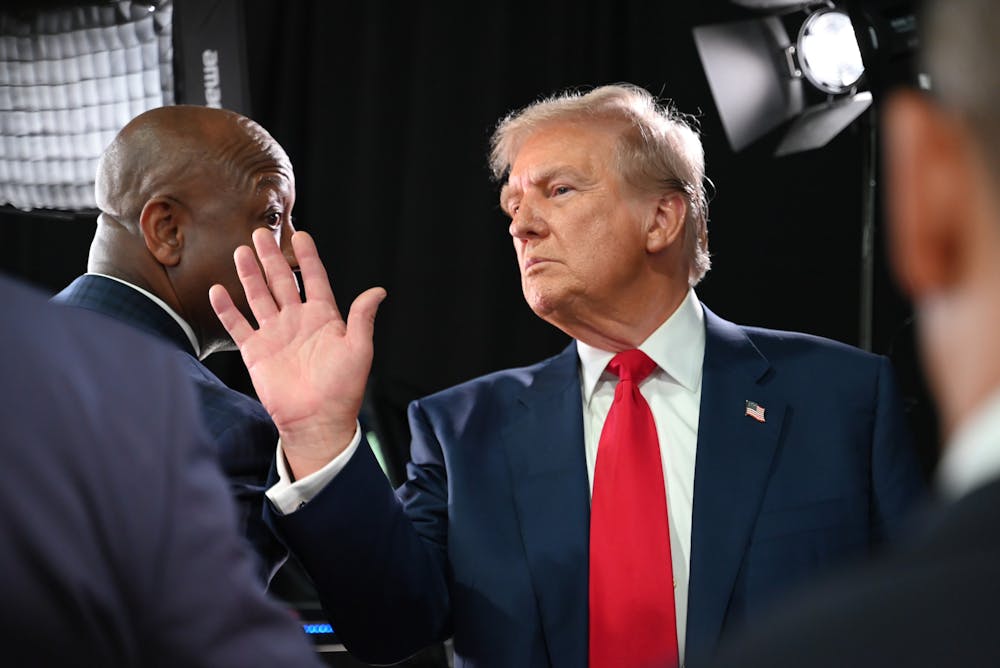
1968 Wharton graduate Donald Trump at the spin room after the presidential debate on Sep. 10.
Credit: Jean ParkIn previous election cycles, former President and 1968 Wharton graduate Donald Trump has frequently mentioned his Ivy League credentials and affiliation with Penn. But as his third presidential campaign nears its end, data indicates that Trump is distancing himself from the University.
During his campaigns for the presidency in 2016 and 2020, Trump frequently invoked his Ivy League credentials and affiliation with Penn and the Wharton School — which he called the “Wharton School of Finance” during the presidential debate in September — to underscore his business acumen and compare himself to his political opponents. However, a recent data analysis by The Daily Pennsylvanian reveals a marked shift in Trump’s messaging, with a decline in positive mentions of Penn.
The DP previously reported that in his first run for president, Trump referenced his Penn affiliation 93 times, incorporating terms such as “Penn,” “Wharton,” or “Ivy League” often in his campaign rhetoric. This approach continued, though much less prominently, during the 2020 election season when he referenced Penn 29 times. As an incumbent candidate, Trump mentioned his academic background less frequently in his campaign rhetoric.
Since Nov. 15, 2022, in Trump’s third campaign for presidential office, he has mentioned “Penn” or the “University of Pennsylvania” 20 times. All but four instances directly referred to the Penn Biden Center rather than his personal affiliation.
"Well, how about all the money that [Biden is] getting from Penn … I went there, the Wharton School of Finance. It’s great. I went there. Penn, they give [Biden] hundreds of millions of dollars, and Biden gets paid a lot of money by the Chinese,” Trump said at a Richmond, Va. rally in March.
In 2016, Trump mentioned the “Ivy League” 20 times, often followed by statements like “I was a good student” or “You have to be smart to go there.” During the 2020 cycle, however, Trump mentioned “Ivy League” only once. This term has not resurfaced in his 2024 campaign.
Trump has aligned himself with the Republican Party’s broader stance this election cycle of distancing itself from — and critiquing — higher education, especially elite colleges and universities. At the Republican National Convention in July, graduates of the Ivy League took to the stage, decrying “the radicalism on our campuses” and the “deceit and lies” of prestigious institutions.
“We’re also going to stand up to the radical left communists, Marxists, fascists, and frauds who have taken over our universities,” Trump said at a Durham, N.H. rally in December 2023. “They’ve destroyed the reputations of once highly respected schools like Harvard, MIT, Columbia, Stanford, University of Pennsylvania, the great Wharton School of Finance. It’s so sad to see it all happening.”
Following media coverage of the Penn Biden Center and its links to former Penn professor and President Joe Biden’s administration, statements such as “Biden couldn’t get into Penn” and comments regarding alleged foreign influence in Penn’s funding have appeared in Trump’s speeches more frequently. As a result, his rhetoric around the University has taken on a more adversarial tone, in contrast with earlier mentions where he claimed Penn as his own.
Throughout the 2016 campaign cycle, “Wharton” alone was mentioned 41 times, with many of the instances accompanied by anecdotes about Trump’s time as a student or assertions of the University’s prestige. Trump has frequently used the phrase “Wharton School of Finance,” though Wharton officially dropped “Finance” from its name in 1972.
In 2024, “Wharton” appeared 45 times, nearly tripling its 2020 mentions and surpassing its frequency in the 2016 campaign cycle. However, an analysis of these references indicates that Trump’s use of “Wharton” in recent speeches has focused less on his educational background and more on discussions related to economic policy or business acumen.
Trump has leveraged Wharton as his prestigious alma mater that informs his understanding of finance and economics as a tactic in debates and interviews throughout the 2024 campaign season. For example, the Penn Wharton Budget Model, a nonpartisan economic analysis initiative, has played a peripheral role in Trump’s campaign discussions. The PWBM, which assesses the economic impacts of various policy proposals, was cited in recent presidential and vice presidential debates as a source of fiscal projections.
Vice President Kamala Harris referenced PWBM’s findings in the September presidential debate that took place in Philadelphia, claiming that Trump’s economic plan would significantly increase the national deficit. In response, Trump mentioned his Wharton degree.
“I went to the Wharton School of Finance, and many of the professors … think my plan is a brilliant plan,” Trump said.
The Daily Pennsylvanian is an independent, student-run newspaper. Please consider making a donation to support the coverage that shapes the University. Your generosity ensures a future of strong journalism at Penn.
Donate








